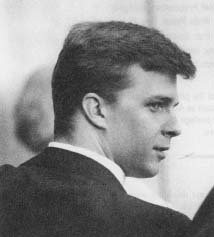Paul Cox Trials: 1994
A Confidantes Testify Against Cox
Cox's first trial took place in June 1994. Prosecutor George L. Bolen had a fairly easy case; Cox had admitted his guilt. Cox's attorney, Andrew A. Rubin, meanwhile argued that Cox had been psychotic and temporarily insane during the episode, and thus was not responsible for his actions. Rubin also tried to quash Cox's fellow AA members' testimony, arguing that they should have a legal privilege against testifying about their comembers similar to that of clerics and psychotherapists. AA is to an alcoholic, Rubin maintained, as a priest is to a penitent or a psychologist to a patient. Without a legal guarantee of confidentiality, a person would not speak freely and the meeting would be pointless.
 Paul Cox during his trial for murdering two doctor in a drunken haze.
Paul Cox during his trial for murdering two doctor in a drunken haze.
Ultimately, trial judge James Cowhey denied Rubin's motion and allowed the testimony to be admitted. Seeven AA mebers, whose identity, in an ironic twist, the court kept secret, testified under subpoena that they had heard Cox confess to the killings. Despite this evidence, the jury deadlocked at 11 to 1 in favor of a murder conviction.
The government tried Cox for murder again in November 1994 with Judge Cowhey again presiding. Once more Rubin tried to block the admission of the AA members' testimony as evidence, but, as before, Cowhey allowed it. This time the jury convicted Cox of manslaughter; Cowhey sentenced him to 16-50 years in prison.
Although AA took no official position in the Paul Cox case, the court's verdict angered many AA members and other self-help (also known as mutualaid) groups, and some legal scholars criticized the policy of restricting the privilege against testifying.
"It doesn't seem right," one attorney noted. "It's like he's being punished for recovering." One priest who was also an AA member voiced a widespread concern when he noted that "once you make Alcoholics Anonymous people talk about one thing, what is to stop the authorities from deciding that they can come around for anything?" Another self-help member stated, "This just points out another middle-class hypocrisy—money buys privacy.… If you have the money, you can have the protection. A lot of people … can't afford a fancy shrink."
The Paul Cox case raised troubling questions about how the legal system should handle confessions that occur in self-help groups at a time when those groups were active and successful. The traditional law of confidentiality is relatively easy to understand and appreciate, but having it applied in such circumstances could lead to a legal quagmire. On the other hand, many people felt that the court's refusal to extend the privilege in this instance was both unjust and a danger to the future success of these programs.
—Buckner F. Melton, Jr.
Suggestions for Further Reading
Reed, Thomas J. "The Futile Fifth Step: Compulsory Disclosure of Confidential Communications among Alcoholics Anonymous Members." Saint John's Law Review, (Fall 1996): 693-753.
Additional topics
Law Library - American Law and Legal InformationNotable Trials and Court Cases - 1989 to 1994Paul Cox Trials: 1994 - A Confidantes Testify Against Cox